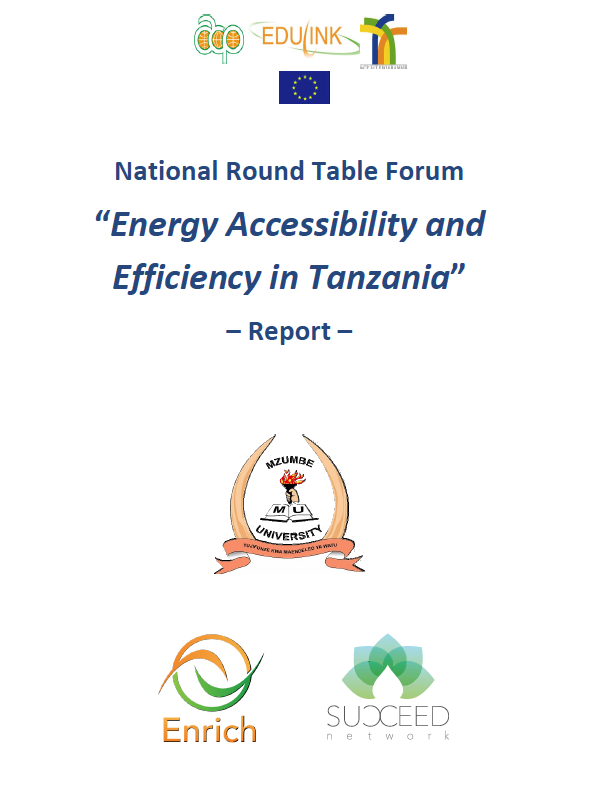Date:
Venue:
 The 1st National Round Table Forum on “Energy Accessibility and Efficiency in Tanzania” was held on August 2nd at Mzumbe University in Morogoro, in the framework of the ACP S&T project ENRICH & the Edulink project SUCCEED Network.
The 1st National Round Table Forum on “Energy Accessibility and Efficiency in Tanzania” was held on August 2nd at Mzumbe University in Morogoro, in the framework of the ACP S&T project ENRICH & the Edulink project SUCCEED Network.
The aim of the event was to bring together the main stakeholders in the field of energy in Kenya (including higher management and researchers from Higher Education Institutions, research & project managers, policy makers, managers from energy industries, experts) to exchange ideas and discuss energy issues at a national level in energy accessibility and efficiency.
The specific objectives of the National Round Table were to:
- Discuss problems and issues in the field of Energy affecting National Stakeholders, with the idea of identifying where the Higher Education System could contribute with specific services/input.
- Enhance awareness of the real needs of Science, Technology and Innovation (STI) related to energy access and efficiency in Tanzania.
- Encourage dialogue and strengthen co-operation links in the energy sector at national level among academia, researchers, industries and policy makers.
- Present the ENRICH & Succeed Network projects and their developments.
The National Round Table brought together several relevant stakeholders in the field of Energy in Tanzania, including representatives from various departments in Mzumbe University, from the University of Dar es Salaam and the private sector (Solargrid Tanzania Ltd.).
In the discussions it was observed that the trajectory shift from dependency on fossil fuel to renewable energy sources, which have been given much attention by researchers and international forums due to its core benefits including cost saving, has increased access to reliable energy sources and environmental protection. The expert opinion based on the opportunities and challenges facing the energy sector in Tanzania is as follows:
- Energy investment in Tanzania is not participative as local people are not involved from the beginning.
- The role of higher learning education (Universities) in STI support on energy access and efficiency is very low due to a lack of financial and policy support for the energy technology transfer to the local population.
- Development of local expertise is highly needed
- Awareness on the cost/benefits of using non-renewable energy sources is lacking in the majority of the population. Thus, sensitization of the population is required via different means.
- There is currently no policy guiding new investments in the energy sectors on how to integrate local opinions in energy investments.
- Political–institutional barriers to energy access and efficiency that contributed greatly to the low adoption of new energy technologies.
- Most of the local population are poor, thus switching from high carbon energy sources (fossil fuels) to low carbon energy sources (solar) has become difficult. The government should intervene or a public-private partnership approach should be adopted to subsidize some of the initial investment costs in the renewable energies.
- The nexus between government policies and local developments priorities is lacking.
- There are several NGOs in Tanzania that deal with training and distribution of solar energy facilities, so that people’s awareness about other energy sources is increasing in urban areas.
The full Report of the Round Table 2Energy Accessibility and Efficiency in Tanzania” is available on our Resources page.


